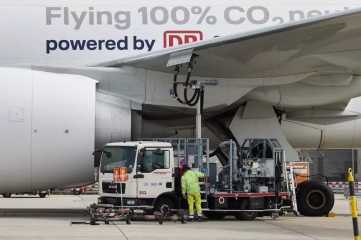The logistics service provider, DB Schenker, announced the extension of its portfolio of climate-friendlier logistics solutions by opening the next chapter of greener transport in air freight. With immediate effect, customers can choose Sustainable Aviation Fuel (SAF) for their air transport to anywhere in the world and independent of the type of aircraft or airline used. Via virtual allocation of biofuel, it is possible to avoid up to 100 percent of CO2 emissions. The logistics service provider purchased over 11,000 tons of SAF and has avoided more than 33,000 tons of CO2e this year.
“We are very proud of the game-changing pioneer project we started with our trusted partner Lufthansa Cargo. Today, we take the next step by starting a global green air cargo network. We have purchased massive volumes of biofuel to push the decarbonization of our industry. Customers of DB Schenker can now virtually book SAF on all trade lanes to thousands of airports. This new flexibility is a success factor and good for the climate. Every ton of biofuel counts,” said Jochen Thewes, CEO of DB Schenker.
“Reducing the carbon footprint in supply chains is possible not only in a far-distanced future but already today. Yes, sustainability comes with a price. But now the choice is available: No DB Schenker customer needs to use traditional kerosene for their air freight anymore. We hope that this message will give further momentum towards sustainability in aviation. Customers who have tested or are already regularly using our SAF offer are very satisfied,” said Thorsten Meincke, Global Board Member for Air & Ocean Freight at DB Schenker.
SAF fueling greener air freight transport
SAF is a well-tested alternative fuel produced from renewable waste and residue raw materials such as used frying oil. The CO2 released during combustion in the engine is only the CO2 removed from the atmosphere during the photosynthesis phase of the plants employed to produce the oils SAF is refined from. DB Schenker only uses biofuel which is certified palm oil free. Currently, SAF is 3-5 times more expensive than regular fossil-based fuel.
For their ESG reporting, customers deciding to pay the premium for virtual allocation of SAF for an air freight shipment receive certification for the exact amount of greenhouse gases avoided. While the actual physical insertion of SAF might occur on different flights, the climate is protected as the exact CO2 emissions of a flight or shipment with conventional kerosene are avoided. This process is called a virtual application and can also be exercised for upstream emissions originating from the production and transport of the biofuel itself.
The new global offer complements DB Schenker’s unique weekly full charter route between Germany and China, launched in spring 2021 and still the only regular air cargo flight in the world to be fully covered by SAF. Over 150 round-trip flights with Lufthansa Cargo have already avoided more than 40,000 tons of CO2e. Individual SAF agreements with further airline partners, such as a recent purchase of SAF credits by Singapore Airlines, will also continue.
Source: Logistics Matters, the global blog by DB Schenker


